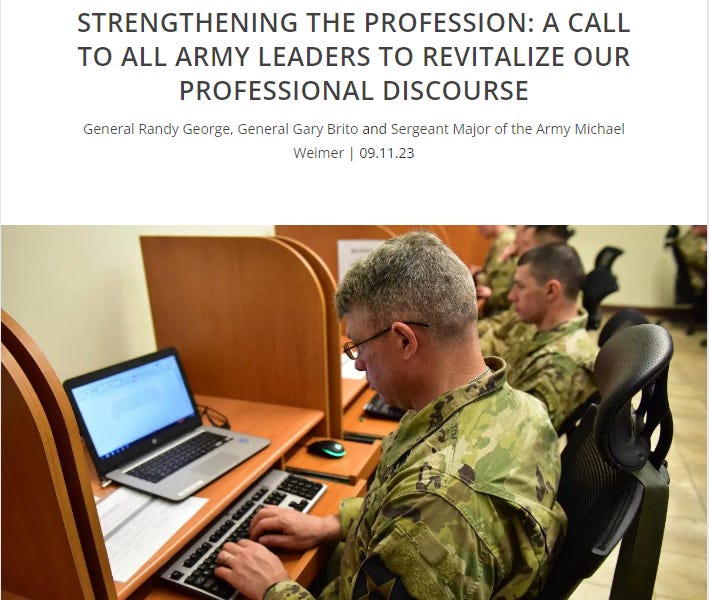Army leaders: Write!
Call-to-action by General George, General Brito, and SMA Weimer
Today, three Army senior leaders committed the Army to “reinvesting in venues that produce vital professional discourse to improve out professional expertise.”
General George, the acting Chief of Staff of the Army, General Brito, the commander of the Army’s Training and Doctrine Command, and Sergeant Major of the Army Weimer published an article at West Point’s Modern War Institute calling for renewal of the Army’s professional publications as part of General George’s broader efforts to Strengthen the Profession of Arms.
Excerpts follow.
On TRADOC’s role in strengthening the profession generally, and writing specifically:
The US Army’s Training and Doctrine Command (TRADOC) will lead this effort to reinvest in the professional dialogue needed for this interwar period as an integral part of a larger plan to strengthen our profession. Created to change the Army and celebrating its fiftieth anniversary this year, TRADOC will strengthen the profession by attending to its institutions, experiences, and culture. These renewed professional publications will give every one of the Army’s soldiers, NCOs, officers, and civilian professionals the opportunity to partake in a conversation as wide, diverse, and thoughtful as the Army itself.
On the Harding Project:
As one way of strengthening the Army’s professional institutions, experiences, and culture, we acknowledge the work of the Harding Project. Started by an Army major and captain, the Harding Project is an effort to renew professional military publications. Their detailed analysis and careful prescriptions convinced us to think harder about the role of our publications in the Army profession.
On the importance of professional military journals:
While today’s media environment is crowded, there is a critical place for a vibrant set of Army publications for several reasons. First, only our publications are backed by the full faith and credit of the Army, and while non-Army outlets have provided valuable space for the discussion of issues vital to our service, we can’t count on them to stick around. Second, even while Army outlets like MWI have demonstrated that there is an appetite for articles and other media that advance our understanding of our profession and the challenges ahead, they rightly do not focus on niche branch issues. That responsibility rests with our professional bulletins: Infantry, Military Intelligence Professional Bulletin, and twelve others. These publications have been impactful throughout their history—Military Review helped drive development of AirLand Battle in the 1970s, for example, as Armor(then Cavalry Journal) drove discourse around the tank in the run-up to World War II—and we need them to remain impactful today. The challenges (and opportunities) of the years ahead are no less formidable than those earlier moments; we need a robust, bottom-up professional discussion to help drive us forward.
On Army University Press’ success with modernization:
We have evidence this approach will work. Six months ago, the Army University Press and Military Review adopted a modern, web-first platform supported by social media. Since then, their weekly visitors are up by 60.1 percent while their subscribers have increased by 54 percent. Army University Press also just added branch magazines to its landing page as a first effort to raise the profile of all of our Army’s professional publications.
A concluding call to action:
As you contribute to our revitalized professional journals, you will be solving problems and you will also be strengthening the profession. For individuals, writing a well-argued article with supporting evidence hones the ability to think critically and communicate. These are essential leader traits. It also requires some courage to put your ideas out there, and both individuals and the institution will take some licks in the process. But this is exactly the type of courage we need right now. It is no different than any other form of training. Well-meaning leaders may be wary of “rocking the boat,” but the Army needs the absolute best ideas at echelon. You have our commitment that we will be open to the best ideas, even if they challenge the sacred cows of the Army’s conventional wisdom. Encourage writing in your formations so that our Army remains the greatest ground force in the world—strong, professional, and ready to defend its fellow citizens.
…
We cannot remain static, so we ask this of you: Write for your branch magazines and professional bulletins. Look for opportunities to volunteer as an editor. Spread the word. And join us as we commit to renewing one of our Army’s greatest assets, our culture of professional military writing.
Read the whole article at MWI.



Jesus Christ on a motorbike.
Y'all will do anything to avoid actual feedback from soldiers. Y'all had long-form feedback on reddit. I'm guessing the mods didn't want to protect your snowflake feelings? First y'all lost Afghanistan, now you're losing social media.
Don't worry fam. I'll be here to highlight ALL the ways you are failing your soldiers. Let's start with that GAO report on the barracks. SMA Grinston got in the trenches to get funding. What is this self-fragilating group doing to help? I don't see a single post about the lack of food at Fort Cavazos.
For real, what is the point of this other than to jerk each other off about how good of leaders you are?